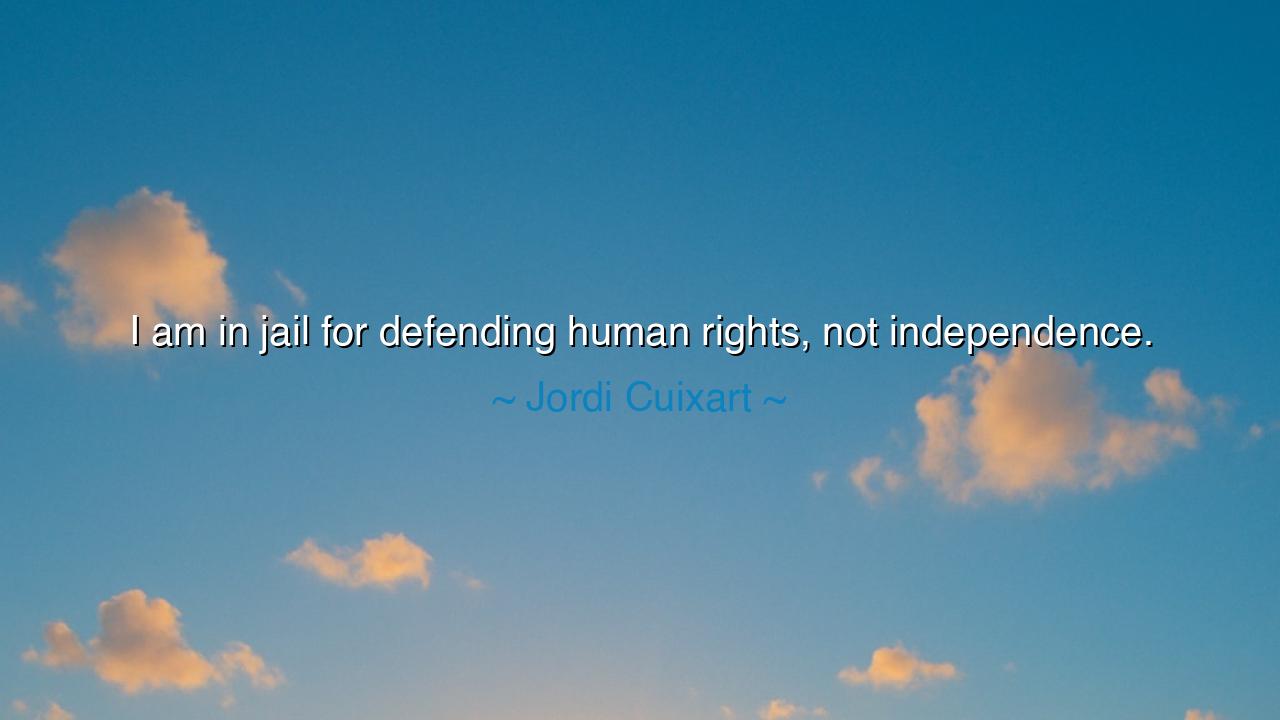
I am in jail for defending human rights, not independence.






“I am in jail for defending human rights, not independence.” Thus spoke Jordi Cuixart, a man imprisoned not for violence, but for conviction — not for rebellion, but for conscience. His words echo through the halls of time like those of martyrs and thinkers before him, who stood unbent before the power of the state. In his voice we hear not defiance born of pride, but courage born of principle — the eternal cry of one who believes that freedom of expression, the right to dissent, and the dignity of all peoples must never be shackled, not even by the might of nations.
To understand these words, one must look to their time and place. Jordi Cuixart, a Catalan activist and cultural leader, was imprisoned after the events of October 2017, when the people of Catalonia sought to vote in a referendum on independence from Spain. The central government declared the act illegal, and those who organized it were charged with sedition and rebellion. Yet Cuixart’s defense was not the cry of a separatist, but of a humanist. “I am in jail for defending human rights,” he said — for he saw in that moment not merely a question of statehood, but of freedom itself: the right of a people to speak, to assemble, and to dream without fear.
His statement reminds us of an eternal truth: that the line between justice and power is often drawn in the dust of the cell floor. When the mighty grow fearful of the words of the free, they call dissent a crime. Yet history remembers differently. From Socrates, who drank the hemlock for questioning authority, to Nelson Mandela, who spent decades behind bars for standing against apartheid, the story repeats: those who speak for liberty are often chained by those who claim to preserve order. Cuixart’s imprisonment, like theirs, reveals the paradox of civilization — that freedom must sometimes be fought for even within societies that call themselves free.
In the ancient world, men spoke of natural law, the idea that justice is older than any kingdom, older even than the written word. The philosopher Cicero declared that right and wrong do not change with borders or regimes, for they are born of reason and conscience. In that same spirit, Cuixart’s words transcend the politics of Catalonia. They speak to all who have stood before the throne of power and said: “You may silence my body, but not my voice.” His cause is not the flag, but the flame — the belief that human rights are not granted by governments, but endowed by existence itself.
Consider also the story of Mahatma Gandhi, who was imprisoned again and again by the British Empire. When accused of stirring rebellion, he answered calmly: “I am in prison for doing what I believe to be right.” Like Cuixart, he saw that true strength is not measured by dominance, but by restraint; not by conquest, but by conscience. The oppressor can chain the body, but cannot enslave the moral will. And so, each act of peaceful resistance — whether in India, in South Africa, or in Catalonia — becomes a mirror reflecting the same truth: that justice, though delayed, cannot be destroyed.
Cuixart’s words also challenge us to look inward. He reminds us that defending human rights is not only the duty of heroes, but of every soul who dares to live honestly. Too often, we wait for others to speak for justice — the leaders, the courts, the brave. Yet history shows that the smallest voice, raised with conviction, can shake the pillars of power. To defend the dignity of others, even when the world calls it folly, is the highest form of courage. For rights are not abstract — they live or die by our daily choices: how we speak, how we act, how we stand for those without power.
The lesson, then, is clear and eternal: freedom is not a gift, but a responsibility. We must defend it not only when it serves us, but when it demands sacrifice. Cuixart’s imprisonment is a reminder that the struggle for justice is never confined to one nation or one age — it is the endless work of humanity itself. Wherever voices are silenced, wherever fear replaces dialogue, we are called to act, not as citizens of one land, but as guardians of the human spirit.
So remember this, my child of light and conscience: the walls of a prison cannot contain truth, nor can bars dim the radiance of moral courage. Jordi Cuixart’s words are not those of defeat, but of triumph — the triumph of conviction over comfort, of humanity over fear. Let his example guide you: speak when silence is demanded, stand when bending seems easier, and fight not for glory, but for the dignity of all. For in that struggle lies the true meaning of freedom — not the freedom to rule, but the freedom to be just.






AAdministratorAdministrator
Welcome, honored guests. Please leave a comment, we will respond soon